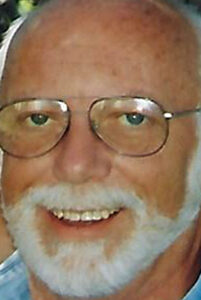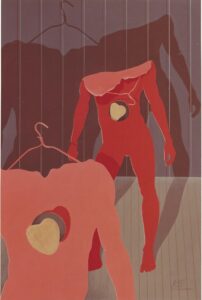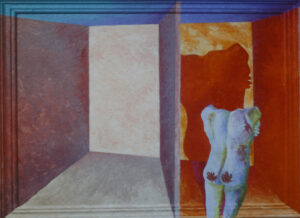Happy National Poetry Month! The same absurd positivity that puts reclusive Emily Dickinson’s face on tote bags across America has designated April for celebrating poetry, based on T.S. Eliot’s decidedly un-celebratory opening to The Waste Land, “April is the cruelest month…” Old Tom was onto something, because the reawakening to life is painful when each day brings news of society’s disintegration, alongside forsythia buds and birdsong.
Nevertheless, we go on.
In Ploughshares, poet Pádraig Ó Tuama’s “The Death of Eve” imagines the beginning of creation as a fall into dividedness: past from future, God from the words we remember or invent about God, and those who speak from those who are able to hear the truth.
On the first day God began splitting
things, and time began.
The angels gathered in little groups
—even though it was forbidden—
and said things like: remember when death
and life were the same?
Levi Abadilla’s dark fable “Adam and Eve as the First Horror Story”, published in Singapore Unbound, suggests that paradise without choice is a kind of hell, especially for women. (Link discovered via Authors Publish, a great newsletter for writing opportunities.)
The Garden extends as far as you can will yourself to walk, stretching on and on and on in whichever direction you pick. An endless hallway of perfect harmony, a perpetual state of existential tunnel vision. There is fruit for you to eat should you wish it. There is water for you to drink should you thirst. There are the creatures of the earth for you to seek company in, because you were made to cure the loneliness of Man, but nothing was created to cure yours.
The snake looks at you the way the Man does, like it doesn’t quite know what to do with you. Adam was lonely, yes, but he didn’t ask for you, specifically, with everything that entails you. You must soothe the emptiness of his heart, and he must be content in your existence. A one-size-that-has-to-fit solution, because there’s no one else; there’s only you to appease him, and your role doesn’t give him a lot of options.
Another archetypal pair discover that the worst part of captivity in a gingerbread house is when you can’t afford dental insurance, in horror writer Lincoln Michel’s bleak and satirical tale “Hansel and Gretel’s Teeth” in the magazine Outlook Springs. (Hat tip to speculative author [sarah] cavar’s Substack, Library/Card.)
…And so Hansel and Gretel began their new life as assistants to the dentist witch. Although the witch called them hygienists, most of their time was spent procuring new teeth. “You can never have enough stock,” the witch would say and send them to graveyard with a pair of spades and pliers.
The witch had calculated their debt at one thousand teeth each. Hansel protested—they’d only used 28 apiece after all—but the witch said this was standard markup plus time, labor, and overhead. The witch put magic collars on their necks that would cause them to howl in pain if they didn’t meet their weekly quotas. “This is called an incentive,” the witch said. The only other rules were that they had to brush the walls of teeth every week and they were forbidden to go into the dark basement.
Yeah, that’s going to work out well…
All the poems in Mom Egg Review’s recent poetry folio, Mothering Alone, are well-crafted and emotionally resonant. I especially admired Jill Crammond’s “When I Sell My Wedding Ring at the Pawn Shop”, Kali Pezzi’s “I Treat My Postpartum Depression With Friends On Facetime” (“I finally weigh the same amount of grief I did at the beginning of the/pandemic” and Julia C. Alter’s “The Nursing Chair”, excerpted below:
…The first person who ever sat in this chair was me,
nursing the baby that used to be our son, deep
into the milk-blue nights, fighting my own monsters.
Now he’s half my son, and half his son.
This is his dad’s gaming chair, and he’s sleeping
upstairs on a mattress on the floor.
In beestung, a quarterly online journal of nonbinary writers, Aerik Francis’ “Fat4Fat” extravagantly celebrates our unruly bodies.
…We are still here, still holding
each other– not cropped out, no, more crop tops & muffin tops, bikini bottoms & bottoms up, yes
in any season we please! Love, we have beautiful bodies. We are more than our bodies
& our bodies are more to love. We sit naked in front of each other, belly to belly,
thunder thighs & lightning strikes.
The driving force of Maureen O’Leary’s noir story “One Thing About Blue” is the narrator’s fascination with a toxic friend. Is there honor among thieves? In the end, maybe, just a little.



